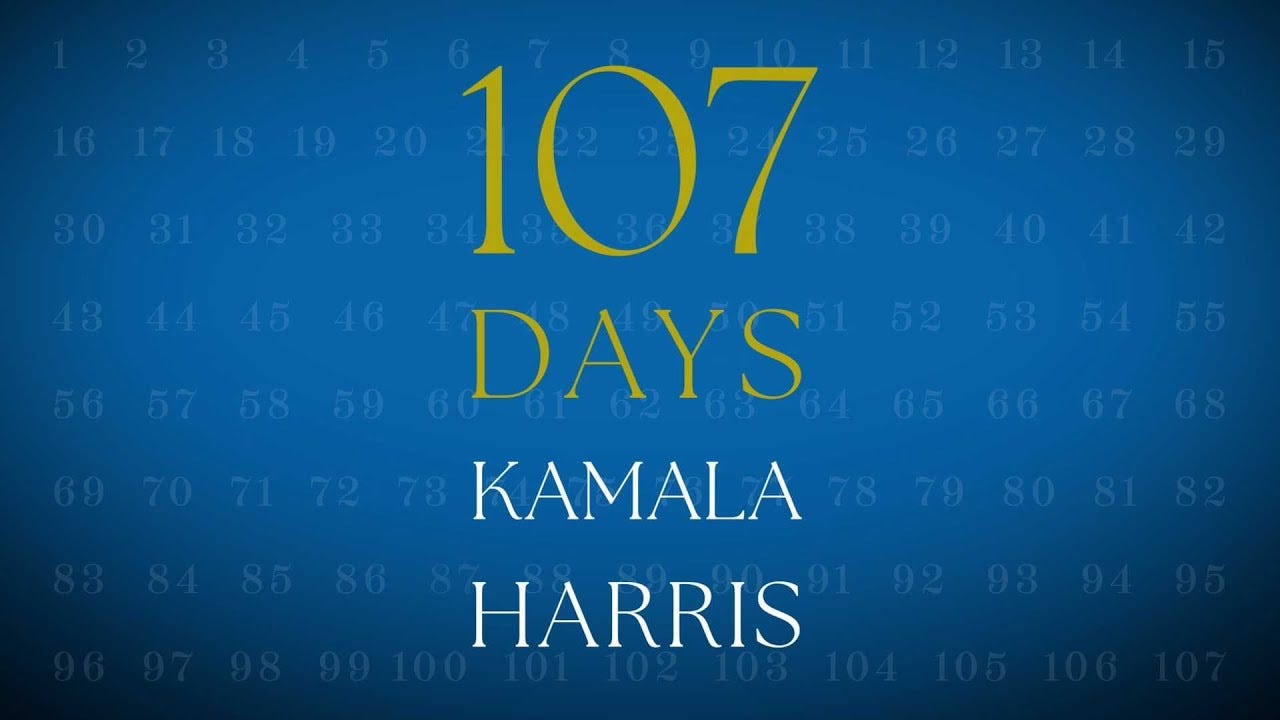Kamala Harris's Campaign Memoir is a Tour-de-Force of Democratic Delusion
This past week I’ve been taking in Kamala Harris’s campaign memoir through various reviews. I’m not planning to read the book myself, though reading these kinds of things has been my bread and butter in the past. As someone who consumed Pete Buttigieg’s Trust cover-to-cover I can safely say that Harris’s 107 Days looks just as insipid, and I particularly recommend this writeup about it by Nesrine Malik for The Guardian and this one by Evelyn Quartz published here on Substack.
Both reviews more or less confirm the impression all but the most Pod Save-pilled Democratic partisans probably had of Harris after watching her campaign last year. Even more than I realized, this was a campaign absolutely steeped in the language of optics and obsessed with celebrity. The culture of the modern Democratic Party and its operative class has long been suffused with these things, but in this case they seem to have been especially pronounced in the candidate herself.
When Harris learned she would be her party’s presidential nominee, Malik tells us, her first thoughts were of her “contact book” and “name recognition.” The cavalcade of celebrities surrounding her — the Harris campaign, we now know, spent tens of millions to book the likes of Oprah and Jennifer Lopez — was intended to signal an ethos of inclusion, showing that Harris was “welcoming everyone into the campaign” (as if, Malik adds, “the power of celebrity could do the unifying work of coalition-building, rather than her own programme and politicking.”) Elsewhere, my head nearly exploded when I read that Harris viewed Jon Bon Jovi’s performance at one campaign event as a “good omen” for no other reason than that he once appeared in an episode of The West Wing alongside fictional Democratic presidential candidate Matthew Santos.
This “immersion in the filmic, [in] the celluloid of US politics” as Malik puts it, is evidently so totalizing that it dominates Harris’s recapitulation of her own campaign even in retrospect. To this end, her book is replete with approving quotes from others about her candidacy, some of which also do the work of outsourcing analysis of important questions and issues to others. Harris, for example, cites one Washington Post writer’s take on her approach to Gaza (“And behold she had her boat through the impossible strait”) as if cribbing from the reception section of a Wikipedia article. The main point here, in other words, is not the substance of Harris’s position on Gaza — which was functionally identical to Joe Biden’s — but how certain media sources wrote about it.
It’s tempting to say this style reflects an outlook and a way of thinking about politics that are fundamentally divorced from reality. In a sense that’s clearly true, but it would more accurate to say that someone like Harris is simply unable to engage with any version of political reality that is unmediated by spectacle or meta-narrative. When your political outlook foregrounds optics, spectacle becomes reality, and the meta-narrative is more or less the only thing that matters. When it comes to her position on Gaza, and also to much else, what’s at stake for a politician Harris is not the thing itself but instead how it was received and represented.1 (“My stance on Gaza? People are saying it’s one of the best stances they’ve ever seen…”)
This may explain why the author, in quasi-Trumpian fashion, devotes so many passages to descriptions of applauding crowds and fawning media reviews, like a pop star taking stock of their latest tour or an influencer pouring over the metrics from their latest viral video. Malik again:
I lost count of the number of descriptions of crowds exploding, roaring, on fire. The audience applause to Harris’s Saturday Night Live appearance was some of the loudest ever heard. She replays her greatest hits, revealing a politician captured by the reverie of rapturous self-selecting crowds and buzzy studios, fatally unable to connect to the voters outside the bubble, who had soured on the Democrats and were checking out, or voting for Trump.
In her review, Evelyn Quartz takes particular note of Harris’s obsession with television and news coverage. In gobsmacking fashion, a book supposedly concerned with the most high stakes electoral event in American history thus quite literally features a passage in which the author complains that “advance staff ruined the lighting and set design of her first live interview, contributing to her bad performance” and elsewhere expends ink to “bask in how Charlie XCX called her ‘brat.’”




